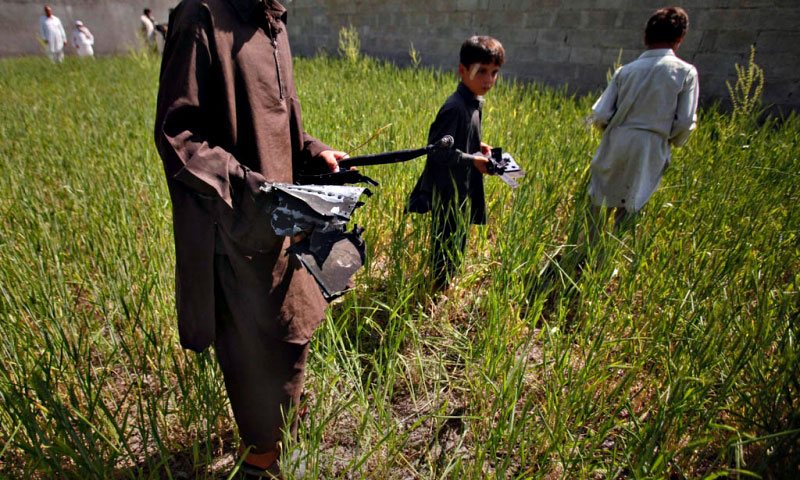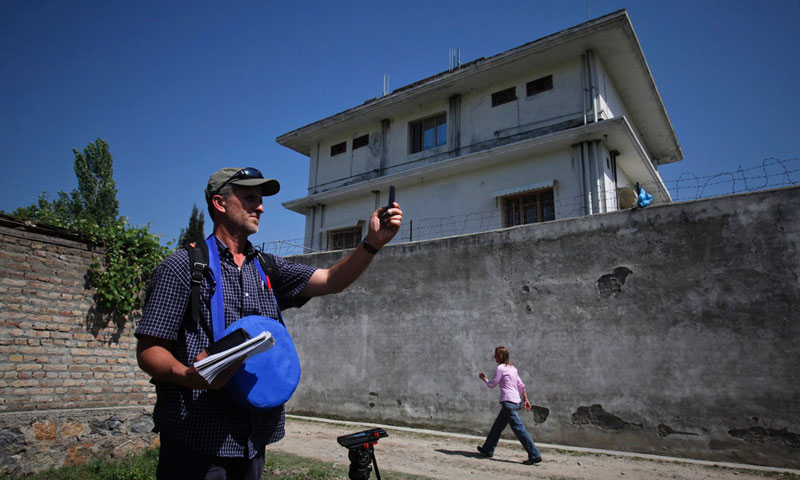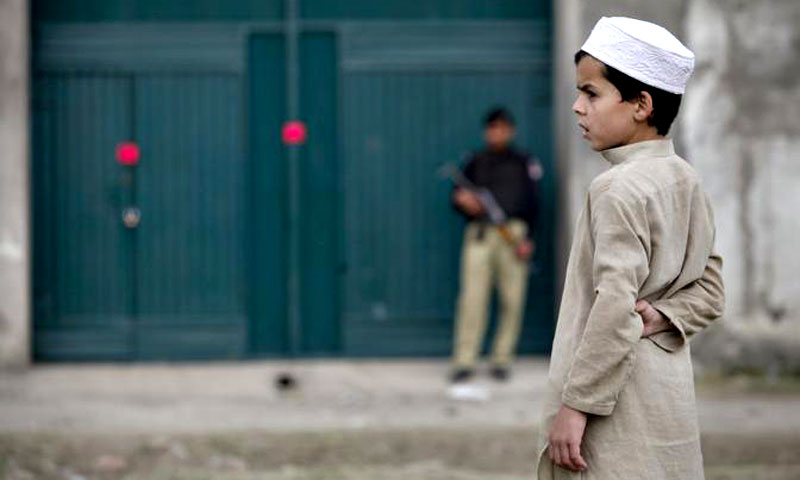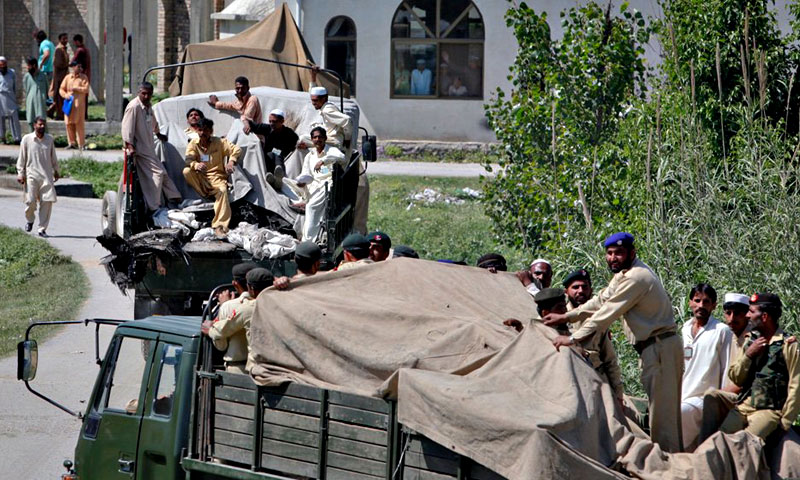
It was just past midnight on May 2, 2011. A police patrol on the outskirts of Abottabad was receiving orders from their seniors to rush towards Bilal Town, a neighbourhood just outside the main entrance to the Pakistan Military Academy (PMA), Kakul. Someone there had heard an explosion and some gunshots. By the time the patrol party traced the site of the explosion to an isolated compound in the locality, a team of American commandos had already flown out after killing the then Al Qaeda chief Osama bin Laden there.
The patrol reached the compound at 01:05 am. Nazar Muhammad, a constable in the party, told the Abbottabad Commission – set up by the government in June 2011 to investigate the circumstances around bin Laden's death – that the first thing that he saw was a group of local residents standing some 100 yards away from the compound. He was told by local residents that the blast was caused by a helicopter crash within the compound. Nobody knew what had actually happened there.
If nothing else, his testimony shows that the police were the first government department to have arrived at the compound — even before officials of the military security posted at the PMA entrance, less than half a kilometre away.

What Muhammad and his companions in the police patrol faced after their arrival, however, is a grave comment on how the military part of the state not just undermines but also bypasses civilian authority. He told the Commission that an army officer along with some troops arrived at the scene soon after the police patrol had reached there. The “army directed the police to go away” as the army officer and the soldiers went inside the compound and took control of the premises. The police, in spite of being the first government agency to reach the compound in the dead of the night, were left standing among the onlookers, Muhammad is reported to have said.
The Commission’s report, partially leaked to the media in the middle of 2013, also relates how Muhammad, even after being turned away by the army team, “continued to remain on duty on the roadside, at a distance of about half a kilometre from [the] compound”. Minutes later, senior officers of the local police started arriving at the scene one by one though the army did not let them do anything but be bystanders. The last police officer to reach the compound was Dr Naeem Khan, a deputy inspector general (DIG) and the highest ranking police officer in the Hazara Division, of which the Abbottabad District is a part. With his arrival, the police could at last enter the compound. Khan, notes the Commission report, tried to interview the survivors in the compound but because of the language barrier, he was unable to “gain much information”. The survivors, bin Laden’s wives and children, were all Arabic speakers and Khan was trying to talk to them in English. His subordinates, in the meantime, started collecting evidence, including the processing unit of a computer, hard disks, and papers lying around.

This, however, could go on only until the commandant of the PMA made it to the compound. As soon he was there, the commandant specifically told Khan to leave the place immediately, the report says. Personnel of the Inter-Services Intelligence (ISI), who also reached there at about the same time, told other police officials to do the same, forcing them to abandon the evidence collected, the report adds.
After receiving the snub from the commandant, Khan withdrew himself from taking any part in probing the incident. Explaining the reasons for his inaction to the Abbottabad Commission, headed by the former Supreme Court judge Justice (retd) Javed Iqbal, he reportedly said he did not do anything because “national interest” dictated that he leave everything for the military to handle. When the Commission asked him as to why legal procedures were not followed in collecting evidence and handling the survivors, he said that the American raid on the compound was “an act of war” and not an “ordinary crime”. The Commission then asked him specifically if the Code of Criminal Procedure was amended to let the military and intelligence agencies handle the evidence and survivors (since under this law, both responsibilities falls in the exclusive purview of the police), Khan replied in the negative. He, however, reiterated that the incident was not of an ordinary nature and expressed his inability to have ensured that the process of evidence collection and handling of survivors followed the law as he was “not even allowed to remain in the premises”.

From how the military authorities kept the civilian administration out of bin Laden’s compound, the civilian departments and officials drew a straightforward conclusion: That they were irrelevant to and unneeded for probing the circumstances of bin Laden’s death. The provincial authorities, therefore, abdicated all the authority they should or could have exercised in the situation.
The officials of Khyber Pakhtunkhwa’s government, including those posted in Abbottabad, told the Commission that they never tried to interview any eyewitnesses or compile a comprehensive report about the incident. The Khyber Pakhtunkhwa “home secretary told the Commission that he neither submitted a report on the Abbottabad incident to the Chief Secretary, nor asked the Commissioner Hazara Division to submit any report on the incident”. The provincial civilian administration, indeed, did not convene even a single formal meeting to discuss the May 2011 raid.
As if to give this abdication of authority a seal of approval, the then Khyber Pakhtunkhwa chief minister, Amir Haider Hoti, told the media in Islamabad just a day after bin Laden’s death that his government had got nothing to do with the situation. He said that the Abbottabad raid came under the jurisdiction of the federal government.
Hoti’s statement, then Khyber Pakhtunkhwa home secretary, Arbab Muhammad Arif told the Commission, gave the provincial administration a clear signal that the
Abbottabad incident pertained to the federal government and it was not for them to deal with it.
Such testimonies, quite expectedly, led the Abbottabad Commission to remark that senior Khyber Pakhtunkhwa officials were behaving “as if the incident has not happened in the territorial jurisdiction of the province”. The members of the Commission noted that the then provincial chief secretary, Captain (retd) Ghulam Dastagir Akhtar, “as the head of civil bureaucracy in the province, should have been aware of the incident”.

For a state struggling to enforce its writ within its territory, such failures to act and the transfer of authority to some other institution provide serious reasons for introspection and, if possible, course correction. But when the media and public intellectuals started fighting it out among themselves over who had failed whom vis-à-vis the Abbottabad raid, the failure of the provincial government did not even figure as an important point to ponder over. There never was any debate over how the civilian administration failed to implement the rule of law and ensure that only legal and administrative regulations and protocols were followed in handling the aftermath of the raid.
This is symptomatic of how little we appreciate the need for enforcing civilian authority in consonance with the rule of law. The entire focus of the debate, instead, was on how military authorities had failed to respond to an American raid within the Pakistani territory, either due to complicity and compromise or the lack of capacity. Like always, we saw the problem having its origin in how we deal with other countries and how other countries deal with us. Everyone who was anyone in this debate neglected the need for analysing how the constituent elements of the state – the military on one side and the civilians on the other – should work within the country.

The civilian administrative inertia, at least partially, stems from the lack of capacity that the provincial and civilian administrations suffer from. “Civil administration is not only inactive, it is also incapable,” says Dr Hasan Askari Rizvi, a political scientist based in Lahore, who has written extensively on civil-military relations in Pakistan. “There is a problem of capacity [that plagues] the civil administration,” he says.
At least one instance cited by the Abbottabad Commission Report, which was officially submitted to the then Prime Minister Raja Pervez Ashraf in January 2013, confirms this assessment. The provincial police department or other parts of the civilian administration in Khyber Pakhtunkhwa did not have the capacity to lab test the wreckage of the American helicopter that had crashed in the compound during the raid. They also did not have experts on weapons and explosives who could analyse the arms used in the incident. All such expertise as was required to do the analysis was, in fact, available only with the armed forces — another unmistakable sign of how the military remains superior to the civilian administration in Pakistan. Predictably, it was the military’s aviation experts, air force officials, and weapons experts from the army who came to the compound, along with intelligence officials, and took all the available evidence with them, never sharing it with the civilians in the coming months and years.

This, Rizvi says, is where the other, and the bigger, part of the problem lies for the civilian administration. “When the ISI or the army intervenes in a matter, the civil administration is afraid to say or do anything,” he says.
A look at what happened in Islamabad, miles away from Abbottabad, only further confirms how the civilian side of the state was only a bystander in the entire saga. Before anyone else, General (retd) Ashfaq Pervez Kayani, the then chief of the army staff, received phone calls from his American counterparts about the raid — much before any civilian leaders, whether in the government or in the opposition, came to know about what had happened in the compound. The civilian bureaucrats and officials were, indeed, the last ones to know about it.
Such military dominance, points out Mian Raza Rabbani, a senior parliamentarian of the Pakistan Peoples Party (PPP), is not in accordance with constitutional provisions. No matter how grave the situation, armed forces have to act under civil administration as per the arrangement envisaged by the Constitution, he says. “Constitutionally speaking, the role of a provincial government is well-defined in handling such situations,” he says. If the Abbottabad incident was an act of war, as DIG Khan claimed, “then the army could get involved only after the federal government had called it in,” says Rabbani, who has been the head of a parliamentary committee on constitutional changes under his party’s government in 2008-2013. “But if we take [bin Laden’s death] as a law and order issue, then it was the provincial government’s prerogative to call in the armed forces,” he says. In both cases, the civilian part of the state would call the initial shots — that is, as per the Constitution.

In practice, however, as Rabbani points out, “the army continues to shut out civil administration and political leadership from any involvement in issues of national security.” If this goes on, the army’s top brass should not expect the civilian leadership to play its due role in handling threats to national security, he argues. “They (the army) didn’t involve the civil government [in investigating the Abbottabad raid], then I think it would be unfair if they (the army) expect the civilians to play a role in national security at a later stage,” he says.
In at least one instance, which indeed sits at the core of the entire Abbottabad fiasco, the civilian side failed to perform its duties vis-à-vis national security only because the military had not shared important information with it. Arif, the then Khyber Pakhtunkhwa home secretary, informed the Commission in his testimony that there was a general impression in the area that some high-value target was present in Abbottabad and Mansehra but, he said, the military and the intelligence agencies never contacted the provincial government to look into such public impressions.

The provincial government, through its network of field officials, could have found bin Laden before the Americans did; thus, possibly saving Pakistan from international embarrassment — Al Qaeda’s chief and the world’s most wanted terrorist was found living a stone’s throw away from a premier military academy in the country.
A retired senior civilian intelligence official says that civilian intelligence agencies and even the police are better placed than the military’s intelligence agencies when it comes to gathering intelligence from the ground, mainly because they have outreach to every part of the country. “They also have the same training, same working style as those of the military’s intelligence agencies. In the field, civilian intelligence agencies are indistinguishable from military intelligence agencies,” he says. “It is only in their power and analytical skills that the military ones are better than the civilian ones,” he says.
The testimony of the Station House Officer (SHO) posted at the police station closest to bin Laden’s compound backs the contention that civilian law-enforcement agencies are quite well placed to know what is happening in their area of jurisdiction. He told the Commission that “everybody in the locality was aware of the two brothers who acted as OBL’s couriers”. The police under him, however, lacked the skills as well as pertinent information to track bin Laden through his couriers.

This lack of capacity could have been overcome to some extent if the military’s intelligence agencies had shared with the local police the details of Indonesian terrorist Umar Patek’s arrest from Abottabad in January 2011. Home Secretary Arif, in his testimony before the Commission, raised this issue in no ambiguous terms. “The results of interrogations with Umar Patek were not shared with the provincial authorities,” he said. He actually went a step further and remarked that this was not the only incident when security agencies had kept the civilian administration out of the loop. “Security agencies never share information with provincial governments,” he is reported to have testified.
It is ironic how in the aftermath of bin Laden’s assassination the military came under tremendous pressure from the media and the public, and how it was the civilian leadership of the country which came squarely behind it. The military leadership, too, was extremely willing to provide in-camera briefings to senior members of the then government and opposition in order to secure their support. Contrast this with how military authorities behaved immediately after May 2, 2011, American attack towards the civilian authorities: They, according to the Commission’s Report, were totally dismissive of any role for the civilians in handling the investigative and intelligence aspects of bin Laden’s death.
This, says political analyst Saeed Shafaqat, justifies the inaction of the provincial government to an extent. How military authorities behaved after bin Laden’s raid, he says, had “rendered the provincial government as totally irrelevant”.










































